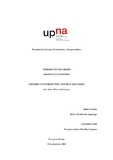Mostrar el registro sencillo del ítem
Género y estereotipos: teoría y realidad
| dc.creator | Arive Pérez de Larraya, Ana | es_ES |
| dc.date.accessioned | 2014-09-22T06:27:48Z | |
| dc.date.available | 2019-10-01T23:00:13Z | |
| dc.date.issued | 2014 | |
| dc.identifier.uri | https://hdl.handle.net/2454/13067 | |
| dc.description.abstract | La Teoría Neoclásica impone restricciones teóricas que, en ocasiones, hacen que la predicción teórica sea diferente al resultado observado en la realidad. Una de estas restricciones es presuponer que la institucionalización a la que se ve sometida la persona (cómo se espera que ella se comporte en sociedad) no afecta a sus decisiones. Sin embargo, observamos cómo la socialización en referencia a temas del cuidado es diferente para hombres y mujeres. En particular, la mujer es socializada para que tenga en cuenta cómo cada una de sus decisiones afectará al cuidado de sus ascendientes y descendientes. Ello puede tener implicaciones en sus decisiones. Resolver un problema de maximización del beneficio sin tener en cuenta cómo las acciones de quien decide afectan a quienes le rodean es incompatible con la socialización que recibe la mujer. A través de un experimento con estudiantes de Introducción a la Economía realizado en la Universidad Pública de Navarra, en este trabajo muestro diferencias en el comportamiento de chicos y chicas cuando se enfrentan al mercado competitivo. En particular, ellas optan por resultados cooperativos que las alejan del máximo beneficio que podían haber obtenido | es_ES |
| dc.description.abstract | Neoclassical theory imposes theoretical restrictions that sometimes make the theoretical prediction be different from the result observed in reality. One of these restrictions is to assume that institutionalization to which the person is subject (how she is expected to behave in society) does not affect their decisions. However, we note how socialization in reference to issues of care is different for men and women. In particular, women are socialized to consider how each of their decisions affects the care of their ascendancies and descendants. This may have implications for their decisions. Solving a problem of maximizing profits regardless of how the one’s own actions affect the others is incompatible with women socialization. Through an experiment with students in Introductory Economics held at the Public University of Navarra, in this paper we show behavioural differences between boys and girls when they face the competitive market. In particular, girls opt for cooperative outcomes that depart from the maximum benefit that could be obtained | en |
| dc.format.mimetype | application/pdf | en |
| dc.language.iso | spa | en |
| dc.subject | Género | es_ES |
| dc.subject | Estereotipos | es_ES |
| dc.subject | Teoría feminista | es_ES |
| dc.subject | Socialización | es_ES |
| dc.subject | Gender | en |
| dc.subject | Stereotypes | en |
| dc.subject | Feminist theory | en |
| dc.subject | Socialization | en |
| dc.title | Género y estereotipos: teoría y realidad | es_ES |
| dc.type | Trabajo Fin de Grado/Gradu Amaierako Lana | es |
| dc.type | info:eu-repo/semantics/bachelorThesis | en |
| dc.date.updated | 2014-08-28T12:42:43Z | |
| dc.contributor.affiliation | Facultad de Ciencias Económicas y Empresariales | es_ES |
| dc.contributor.affiliation | Ekonomia eta Enpresa Zientzien Fakultatea | eu |
| dc.description.degree | Graduado o Graduada en Economía por la Universidad Pública de Navarra | es_ES |
| dc.description.degree | Ekonomian Graduatua Nafarroako Unibertsitate Publikoan | eu |
| dc.rights.accessRights | info:eu-repo/semantics/openAccess | en |
| dc.rights.accessRights | Acceso abierto / Sarbide irekia | es |
| dc.embargo.terms | 2019-10-01 | es_ES |
| dc.contributor.advisorTFE | Husillos Carques, Francisco Javier | es_ES |
| dc.contributor.advisorTFE | Echávarri Aguinaga, Rebeca | es_ES |


